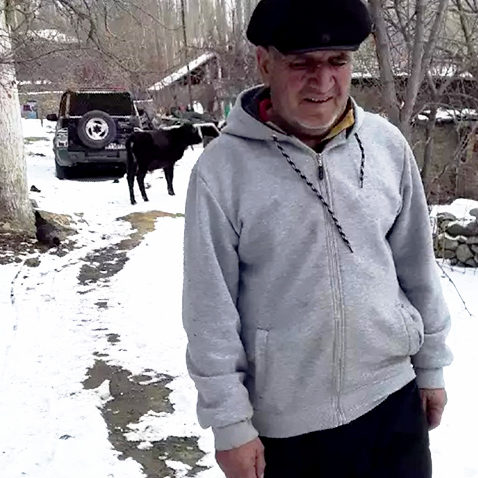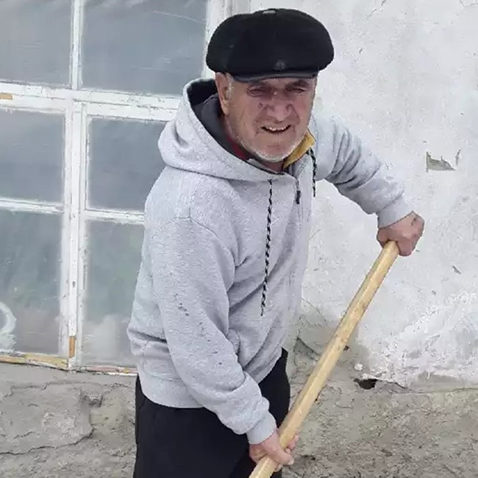As the COVID-19 pandemic developed, medical centers around the world faced a shortage of medical equipment and supplies needed to care for patients. These medical facilities also were searching for ways to connect with specialists who could guide them through treating coronavirus patients.
In the Gorno-Badakhshan Autonomous (GBAO) region of Tajikistan, the Aga Khan Foundation (AKF) supported hospitals with essential medical equipment and medicines, as well as telehealth technology to connect with specialists, to help people like Tavakalov Amin.

Tavakalov is 70 years old and lives in a mountainous village in Tajikistan’s Rushan district. On a warm afternoon in August 2020, as Tavakalov went about his daily farming work, he felt weak and could not catch his breath.
Tavakalov’s symptoms were initially mild and did not require hospitalization. However, his condition gradually deteriorated, and he was admitted to the Rushan District Hospital for treatment. At the hospital he was diagnosed with pneumonia caused by the coronavirus. As Tavakalov’s condition became unstable, the doctors determined that they will not be able to help him the district hospital and decided to transfer him to the Aga Khan Medical Center in Khorog (AKMC,K) that had necessary equipment, such as sophisticated mechanical ventilators, a computerized tomography (CT) scanner and e-health resources that connect local doctors with experts from around the world.
The doctors at Rushan Hospital coordinated with AKMC,K to transfer Tavakalov to their High-Dependency Unit (HDU). Tavakalov’s oxygen saturation were critically low, and his CT scan indicated that 90% of his lungs were damaged by COVID-19. He was no longer able to breathe on his own so the team at AKMC,K intubated him and used a ventilator to keep him alive.
Working Together for Better Patient Care
Rushan District Hospital is a government-run facility that serves residents coming from remote rural villages and mountain communities within the district. As a smaller medical facility, Rushan District Hospital reached out to the AKMC,K for support in order to provide the best possible care to the residents of Rushan.
AKMC,K is a private hospital run by the Aga Khan Health Services (AKHS) with the mandate to provide compassionate, accessible, cost-effective, and high-quality care to the people of Badakhshan region of Tajikistan and cross-border areas. Their aim is to address the health issues of the communities in these regions and to become a role model for hospital care in the region and Central Asian countries. The facility opened its doors in 2019 and has specialized medical staff and modern equipment to address a wide range of health problems.
In June 2020, as the COVID-19 pandemic worsened, GBAO’s Department of Health and AKHS partnered to provide the best possible care to citizens by referring severe and critical patients from GBAO’s district hospitals to AKMC,K, which had the necessary expertise.
Local Impact: A Transformative Partnership in Asia and Africa is a joint initiative of the United States Agency for International Development (USAID) and AKF. The project worked with the Government of Tajikistan slow the spread of COVID-19 and care for severely ill patients in 2020. With Local Impact’s funding, AKMC,K provided quality and timely treatment to patients, especially elderly people.
To support an even wider group of clinics and patients, Local Impact supported AKMC,K with innovative digital health technology for telemedicine, personal protective equipment, essential medications and medical supplies, COVID-19 diagnostic machines and tests, mechanical ventilators, and oxygen cylinders to help critically ill patients. Similar support, including contributing medical equipment, pharmaceuticals, and infection prevention supplies, was also provided to the Khorog General Oblast Hospital (KGOH) and the district hospitals in Shugnan, Murghab, Vanj, Roshtqala, Rushan, Ishkashim, and Darvaz to help them respond to mild to moderate COVID-19 cases.
“Access to infrastructure and services was [a] critical demand,” explained Yogdor Fayzov, the Governor of GBAO. “Aga Khan Medical Centre in Khorog... became [the] main diagnostic and treatment center for COVID patients and... was [a] great support.”
The public-private partnership between Rushan District Hospital and AKMC,K was enhanced by AKMC,K’s relationship with the Ismaili Health Professional Network (IHPA). IHPA doctors had considerable experience treating COVID-19 in other parts of the world, and they were able to share their experience with Tavaklavo’s doctors at AKMC,K through telehealth technology.
A Full Recovery
AKMC doctors arranged for a teleconference with a group of IHPA specialists using high-definition telecommunication equipment provided by Local Impact. The IHPA doctors and nurses shared their knowledge and experience based on established best practices and standard of care with AKMC so Tavakalov would have the best possible chance of recovering.
The AKMC doctors incorporated the advice provided by the IHPA doctors into Tavakalov’s care. Slowly, Tavakalov improved. After weeks of fighting COVID, he was ready to be taken off the ventilator. Eventually, Tavakalov was able to leave AKMC,K and move back to Rushan District Hospital where his original medical team resumed his care. After another week in Rushan Hospital, he was well enough to go home.
It took a month of close coordination between Rushan Hospital, AKMC,K, and IHPA, but finally, Tavakalov could sleep in his own bed.
Tavakalov is now enjoying his good health by spending time with family and carrying out his daily work.

He continues to stay in touch with the doctors at AKMC,K and Rushan Hospital, and IHPA still provides support through telemedicine. He is grateful to all three institutions for caring for him and thankful to the donors who helped the hospitals stay connected through technology.